Finding The Young-Horse Line Between Too Much And Not Enough
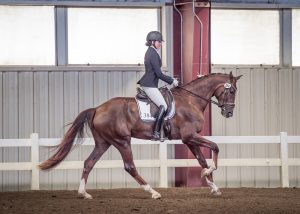 I bought Ojalá (Vitalis—Fienna, Sir Sinclair) from her breeder, Belinda Nairn, as a foal. She grew up in a field, learned to stand on crossties, lead, have a bath, be civilized. At 3, she was backed. She learned to walk, trot and canter on the bit like a lady, work with other horses in the ring, and hack out by the time I picked her, now 4, up in April of this year. I rode her and found her delightful, and then handed the keys to my wonderful assistant trainer, Ali Redston, who has a much greater affinity for the youngsters than I do. They went on an off-property outing, which was uninteresting. They went to a recognized show, where they performed admirably in two Materiale classes, and behaved to perfection.
I bought Ojalá (Vitalis—Fienna, Sir Sinclair) from her breeder, Belinda Nairn, as a foal. She grew up in a field, learned to stand on crossties, lead, have a bath, be civilized. At 3, she was backed. She learned to walk, trot and canter on the bit like a lady, work with other horses in the ring, and hack out by the time I picked her, now 4, up in April of this year. I rode her and found her delightful, and then handed the keys to my wonderful assistant trainer, Ali Redston, who has a much greater affinity for the youngsters than I do. They went on an off-property outing, which was uninteresting. They went to a recognized show, where they performed admirably in two Materiale classes, and behaved to perfection.
And then I gave “Lala” a month off.
Why? She was sound. She was working well. She approached each day cheerfully, with good manners both on the ground and under saddle. She’s barefoot behind, clean legged and has a strong topline. Why stop?
Well … because I could. Because there really isn’t anything else I particularly care about for her right now. Lala happens to also be truly every inch of 18 hands, but I’m truthfully not sure I would have done anything differently if she were 16 hands. I came back to this: At 4 years old, there’s really not much to win, but plenty to lose by doing too much.
Read the rest at The Chronicle of the Horse!
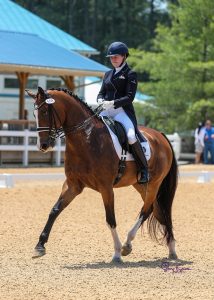 I’m writing this blog from my couch, where it is a delightful 72 degrees. I have an iced coffee, some office work and a leisurely Monday afternoon ahead of me. I am just home from teaching a clinic in Texas, where the high each day was 102. It’s been marginally cooler here in Virginia, but not by much during our recent heatwave.
I’m writing this blog from my couch, where it is a delightful 72 degrees. I have an iced coffee, some office work and a leisurely Monday afternoon ahead of me. I am just home from teaching a clinic in Texas, where the high each day was 102. It’s been marginally cooler here in Virginia, but not by much during our recent heatwave.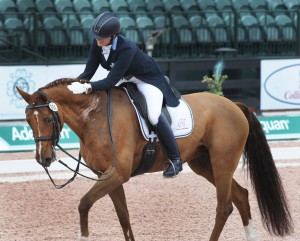 She was 5 but green broke, still owned by her breeder. I was 21, a veteran of the Young Rider and U25 programs, and as such I thought I knew a few things about horse training. I was wrong, as young people filled with hubris are often are. But I couldn’t have asked for a better teacher than Ellegria.
She was 5 but green broke, still owned by her breeder. I was 21, a veteran of the Young Rider and U25 programs, and as such I thought I knew a few things about horse training. I was wrong, as young people filled with hubris are often are. But I couldn’t have asked for a better teacher than Ellegria.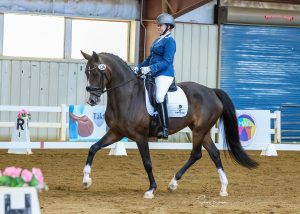 Dogs, horses, humans—we’re all malleable, but never more than as youngsters. Our early years are so terribly critical. It’s why the folks who take Thoroughbreds off the track, or who fetch neglect cases from the auction, and make them into good citizens in sport disciplines are really so extraordinary. It’s much easier to teach something well the first time than it is to install it as an after-market add-on.
Dogs, horses, humans—we’re all malleable, but never more than as youngsters. Our early years are so terribly critical. It’s why the folks who take Thoroughbreds off the track, or who fetch neglect cases from the auction, and make them into good citizens in sport disciplines are really so extraordinary. It’s much easier to teach something well the first time than it is to install it as an after-market add-on.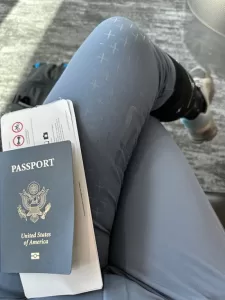 This winter, I sold my top Grand Prix horse, Guernsey Elvis, who was owned by an amazing syndicate of supporters. Nearly all of them wanted to continue the partnership and invest in another horse for me to bring up the levels. While I always exhaust my American contacts first, the reality of shopping for international-caliber horses is that our European friends make more of them than we do here in the United States—and in countries that are much smaller than ours—so shopping in Europe is often more efficient. Add in that U.S. horse prices are still really pretty wild at the high end. So I recently found myself in the fortunate position of organizing an adventure to Denmark—my first in the several years since the pandemic paused easy travel—guided by my friends and agents of the past 15 years, Babsi Neidhardt-Clark and Martha Thomas.
This winter, I sold my top Grand Prix horse, Guernsey Elvis, who was owned by an amazing syndicate of supporters. Nearly all of them wanted to continue the partnership and invest in another horse for me to bring up the levels. While I always exhaust my American contacts first, the reality of shopping for international-caliber horses is that our European friends make more of them than we do here in the United States—and in countries that are much smaller than ours—so shopping in Europe is often more efficient. Add in that U.S. horse prices are still really pretty wild at the high end. So I recently found myself in the fortunate position of organizing an adventure to Denmark—my first in the several years since the pandemic paused easy travel—guided by my friends and agents of the past 15 years, Babsi Neidhardt-Clark and Martha Thomas.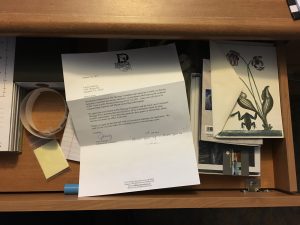 I went to groom for Carol Lavell when I was 22. I had done Young Riders, I had done the U25 Championships, and I thought I was quite the fancy thing. She offered me cash, which I took, of course, but I also asked for two lessons a week to be included in my salary. In my first lesson, I brought my Grand Prix horse. Carol and I worked on steering, mostly at the walk, because she said I didn’t know how, and how could I move on to the big things until I could turn at the walk?
I went to groom for Carol Lavell when I was 22. I had done Young Riders, I had done the U25 Championships, and I thought I was quite the fancy thing. She offered me cash, which I took, of course, but I also asked for two lessons a week to be included in my salary. In my first lesson, I brought my Grand Prix horse. Carol and I worked on steering, mostly at the walk, because she said I didn’t know how, and how could I move on to the big things until I could turn at the walk?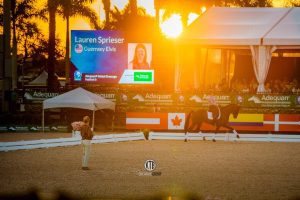 Four years ago last month, Facebook reminded me, was Elvis’ debut into the American dressage world: We’d been selected to ride in a master class with the legendary Isabell Werth. He went in the ring second in a long list of fabulous horses, following a fantastic youngster from Helgstrand, and succeeded by more experienced horses with bigger gaits.
Four years ago last month, Facebook reminded me, was Elvis’ debut into the American dressage world: We’d been selected to ride in a master class with the legendary Isabell Werth. He went in the ring second in a long list of fabulous horses, following a fantastic youngster from Helgstrand, and succeeded by more experienced horses with bigger gaits.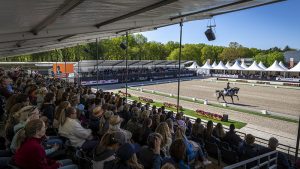 At January’s U.S. Equestrian Federation Annual Meeting, participants talked extensively about “social license to operate.” The phrase refers to how the world views something, and whether people consider it acceptable in modern society. Google tells me the term originally developed in reference to extraction of natural resources—mining, an industry that is certainly plagued with environmental and human rights problems, and drilling for fossil fuels, for example.
At January’s U.S. Equestrian Federation Annual Meeting, participants talked extensively about “social license to operate.” The phrase refers to how the world views something, and whether people consider it acceptable in modern society. Google tells me the term originally developed in reference to extraction of natural resources—mining, an industry that is certainly plagued with environmental and human rights problems, and drilling for fossil fuels, for example.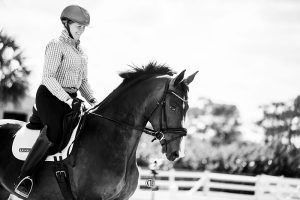 What a long strange trip it’s been, 2022. In all things with horses, we plan, and God laughs, so it’s never really a shocker to me when whatever the plan was in January stops being the plan about 837 times before the year’s end. Add in a pandemic coming to a… well, “end” isn’t quite right, but at least a new phase—plus an economic boom, an economic bust, life, death, losing a work wife and gaining a husband, and it’s been a year for the books.
What a long strange trip it’s been, 2022. In all things with horses, we plan, and God laughs, so it’s never really a shocker to me when whatever the plan was in January stops being the plan about 837 times before the year’s end. Add in a pandemic coming to a… well, “end” isn’t quite right, but at least a new phase—plus an economic boom, an economic bust, life, death, losing a work wife and gaining a husband, and it’s been a year for the books.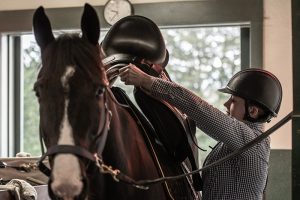 There’s a real hiring crisis right now, and it’s across all industries, not just ours. The COVID pandemic has been unkind on so many fronts. To me, we’ve got two problems. One is about the expectations of those who think they want to work in the horse industry, about what a day, a week, a year in the life looks like. And the other is a serious problem with our industry and how we shape our business models.
There’s a real hiring crisis right now, and it’s across all industries, not just ours. The COVID pandemic has been unkind on so many fronts. To me, we’ve got two problems. One is about the expectations of those who think they want to work in the horse industry, about what a day, a week, a year in the life looks like. And the other is a serious problem with our industry and how we shape our business models.